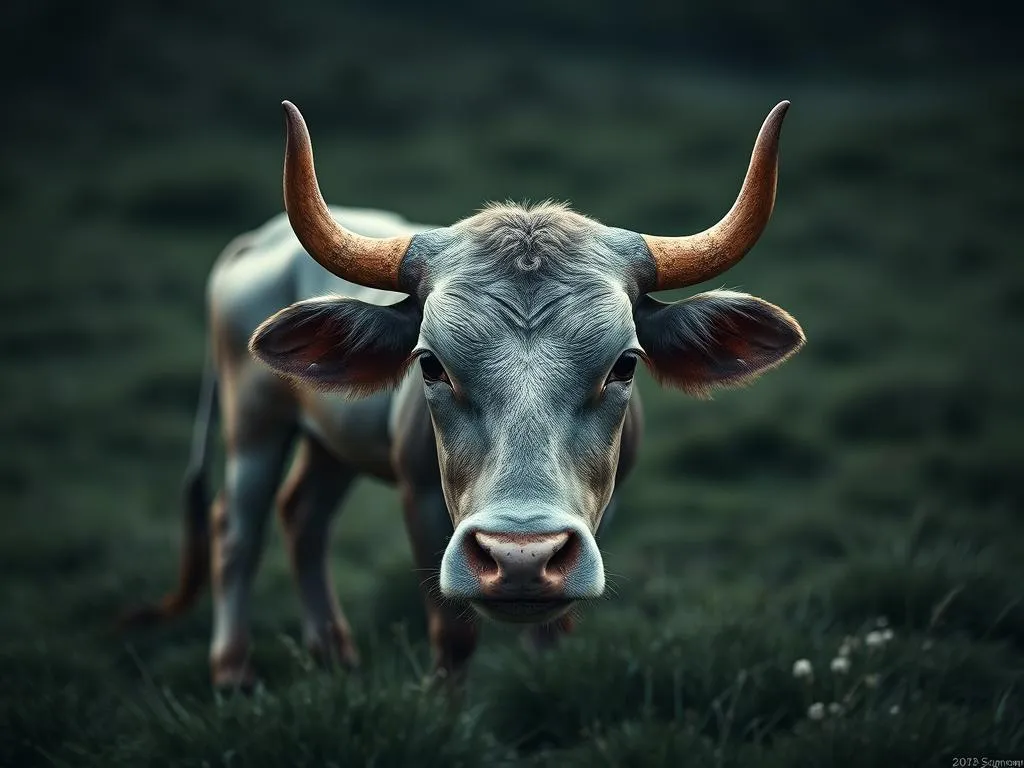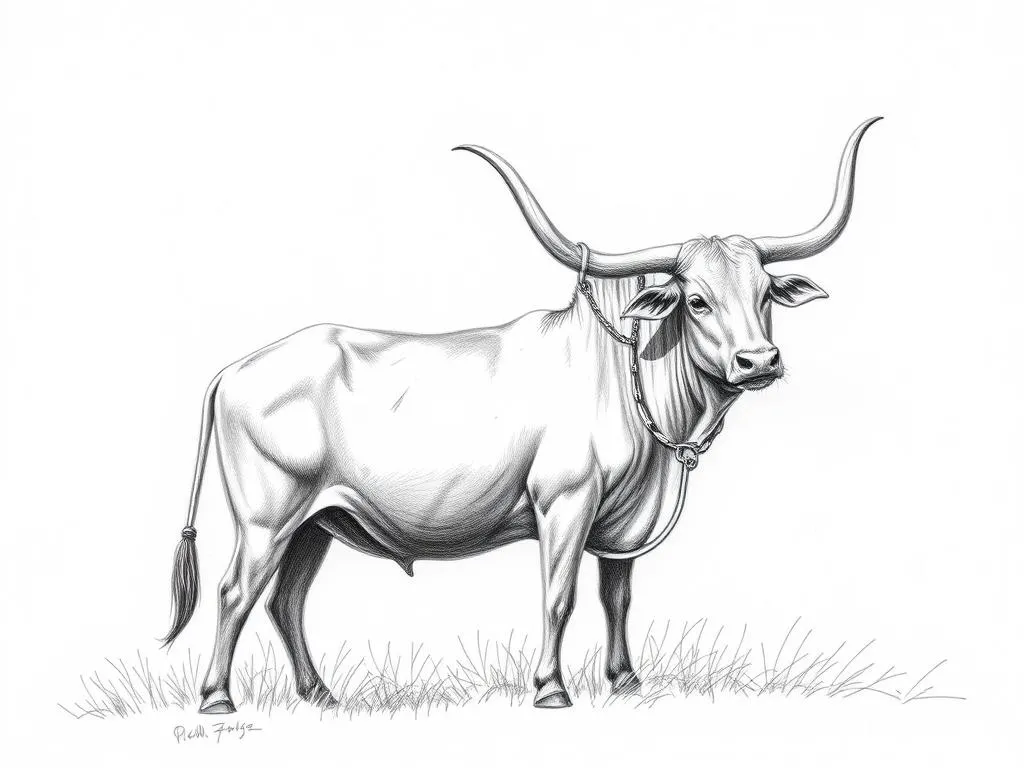The Symbolism of Zebu: A Sacred Mammal of Resilience and Prosperity

Disclaimer: Some images on this website are AI-generated artworks and may not accurately represent real animals.
Understanding the Zebu
Introduction to the Zebu
The zebu, scientifically known as Bos indicus, is a fascinating breed of domestic cattle characterized by its distinctive hump over the shoulders and long, drooping ears. These unique physical features not only contribute to the zebu’s striking appearance but also play a crucial role in its adaptability to various climates. Zebu are generally smaller in size compared to other cattle breeds, with a height ranging from 4 to 5 feet and weighing between 800 to 1,200 pounds.
| Physical Characteristic | Description |
|---|---|
| Hump | Prominent, muscular structure on the back |
| Ears | Long and drooping |
| Coat | Short, can be gray, white, or black |
| Eyes | Large, expressive |
| Temperament | Generally docile and resilient |
Zebu are primarily found in regions with tropical and subtropical climates, particularly in South Asia, Africa, and parts of Latin America. Their domestication dates back thousands of years, primarily for agricultural purposes, such as plowing fields and providing milk. Understanding the zebu’s role in agriculture is essential to appreciating its symbolism across various cultures.
Cultural Significance
Across many cultures, particularly in South Asia and Africa, the zebu holds a significant place in agricultural practices and economies. In countries like India, zebu cattle are revered and have deep-rooted cultural ties, often associated with deities and religious practices. They are considered symbols of wealth and prosperity, integral to the sustenance of rural communities.
In Africa, zebu are known not just for their labor but also for their vital role in trade and social status. Owning zebu can enhance an individual’s reputation within their community. This cultural significance lends itself to the broader symbolism of the zebu, representing resilience, adaptability, and a connection to the land.

Symbolism & Spiritual Meaning
Resilience and Adaptability
One of the most profound aspects of zebu symbolism is its representation of resilience and adaptability. Zebu thrive in harsh environments, often surviving with minimal resources. Their ability to withstand droughts and extreme temperatures makes them a symbol of strength in adversity.
In many African cultures, the zebu embodies the spirit of perseverance, reflecting the daily struggles of farmers who rely on their strength to cultivate the land. This resilience is mirrored in the life of those who identify with the zebu’s qualities, encouraging them to face challenges head-on.
Fertility and Abundance
The zebu is also closely associated with fertility and abundance. In agricultural societies, cattle are seen as a source of wealth, nourishment, and sustenance. The zebu’s ability to provide milk, labor, and offspring makes it a vital asset for families and communities. This connection to agricultural prosperity elevates the zebu to a symbol of wealth.
In many cultures, zebu are involved in rituals celebrating fertility, harvests, and abundance. They are often part of ceremonies that pray for good yields and favorable conditions for farming, underscoring their importance as symbols of nourishment and life.
Spiritual Protection
In various traditions, the zebu is believed to offer spiritual protection. Some cultures view the zebu as guardians, protecting their owners from misfortune and ill will. This belief can manifest in rituals where zebu are honored and revered, reinforcing their role as spiritual protectors.
Their significance in rituals often involves offerings and prayers, invoking the zebu’s strength and protection. This aspect of zebu symbolism enhances its value beyond mere agricultural importance, embedding it deeply within the spiritual fabric of communities.
Zebu in Dreams
Interpreting Zebu Dreams
Dreams involving zebu can carry profound meanings and insights. Common themes associated with zebu in dreams include resilience, strength, and the need for adaptability in waking life. Dreaming of a zebu may symbolize a call to embrace one’s inner strength or adapt to challenging circumstances.
| Dream Theme | Potential Interpretation |
|---|---|
| Zebu grazing | Abundance and prosperity on the horizon |
| Zebu in distress | Warning of potential struggles ahead |
| Zebu being cared for | Nurturing aspects of one’s life |
| Zebu in a herd | Importance of community and support |
Messages and Insights
When encountering a zebu in a dream, it may serve as a reminder to draw on personal resilience. This powerful mammal can symbolize the need to stay grounded and focused during turbulent times. Furthermore, zebu dreams may also provide guidance, prompting individuals to acknowledge their strengths and the support of their communities.
For those who experience zebu in their dreams, it can also indicate a period of personal growth. The presence of a zebu may inspire you to reflect on your life’s challenges and recognize your capacity to overcome them, aligning with the deeper symbolism of this remarkable animal.
Modern Interpretations
Zebu in Popular Culture
In contemporary society, the zebu has found its way into popular culture, represented in various forms of art, literature, and media. As an emblem of sustainability, zebu are often featured in discussions about eco-conscious farming practices. Their hardiness and ability to thrive in less-than-ideal conditions make them a focal point in conversations about sustainable agriculture.
Artistic representations of zebu also emphasize their beauty and strength, portraying them as symbols of resilience. This modern interpretation aligns with the ancient symbolism, showcasing their enduring relevance in today’s world.
Zebu in Contemporary Spirituality
Modern spiritual practices have embraced zebu symbolism as well. Many individuals who resonate with the qualities of the zebu see it as a spirit animal, embodying personal empowerment and resilience. Engaging with zebu symbolism in meditation and spiritual practices can serve as a source of inspiration, reminding individuals of their strength and adaptability.
Zebu’s representation in contemporary spirituality encourages people to explore their connections to nature and the animal kingdom, fostering a deeper understanding of their inner selves. The zebu becomes a powerful metaphor for personal growth and resilience, echoing its traditional significance.
Key Takeaways
- The zebu symbolizes resilience and adaptability, thriving in challenging environments.
- Culturally significant in South Asia and Africa, zebu represent agricultural prosperity and wealth.
- Zebu are seen as spiritual protectors in various traditions, reflecting their deep-rooted symbolism.
- Dreams involving zebu often highlight themes of resilience and personal growth, offering insights into one’s life journey.
- In modern contexts, zebu symbolize sustainability and empowerment, resonating with contemporary spiritual practices.
Conclusion
Understanding zebu symbolism enriches our appreciation for this remarkable mammal and its significance across cultures. The zebu embodies qualities of strength, prosperity, and adaptability, serving as a powerful reminder of the resilience required to navigate life’s challenges.
As we reflect on our personal connections to the zebu, we may find inspiration to embrace our own strength and adaptability, drawing on the lessons this sacred mammal offers. Whether through dreams or daily life, the zebu encourages us to cultivate resilience and recognize the abundance that surrounds us. Through this understanding, we can honor the zebu as a symbol of strength, prosperity, and adaptability in our own journeys.







